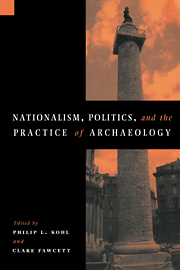Book contents
- Frontmatter
- Contents
- List of maps
- List of contributors
- Acknowledgments
- Part I Introduction
- Part II Western Europe
- Part III Eastern Europe and Eurasia
- Part IV East Asia
- 11 Thirty years of Chinese archaeology (1949–1979)
- 12 The regionalist paradigm in Chinese archaeology
- 13 The politics of ethnicity in prehistoric Korea
- 14 Nationalism and postwar Japanese archaeology
- Part V Commentary
- Bibliography
- Index
13 - The politics of ethnicity in prehistoric Korea
Published online by Cambridge University Press: 06 October 2009
- Frontmatter
- Contents
- List of maps
- List of contributors
- Acknowledgments
- Part I Introduction
- Part II Western Europe
- Part III Eastern Europe and Eurasia
- Part IV East Asia
- 11 Thirty years of Chinese archaeology (1949–1979)
- 12 The regionalist paradigm in Chinese archaeology
- 13 The politics of ethnicity in prehistoric Korea
- 14 Nationalism and postwar Japanese archaeology
- Part V Commentary
- Bibliography
- Index
Summary
Archaeology in Korea is viewed, as it is elsewhere in east Asia, as a branch of history rather than anthropology. One consequence of this position is that attention to the remote past has been focussed largely on Korean ancestors: who they were in reference to Chinese historic documents; and how and when they came to the Korean peninsula. By the time of the formation of states in the southern Korean peninsula and the Japanese islands, a fully Korean presence in the peninsula is assumed, and the identity of Koreans within the peninsula is complete.
Questions of ethnic origins have thus been paramount in terms of approaches to prehistory in Korea, and in the past answers have been found with reference to mythology and by appeal to ancient texts. More recently, archaeology has been asked to supply some answers to ethnic questions, or in some cases archaeology has been used to validate the established mythological or legendary constructs regarding the original ancestors. At this intersection of mythology, history, and archaeology lie many problems for the interpretation of the past. Political and nationalistic motivations for preferring one interpretation over another, although more covert than overt, are at the heart of these problems.
Although ethnicity is called upon to validate political claims in many places, Korea's particular variation on the theme helps to illuminate the way ethnicity in the past is and has been approached.
- Type
- Chapter
- Information
- Nationalism, Politics and the Practice of Archaeology , pp. 218 - 231Publisher: Cambridge University PressPrint publication year: 1996
- 2
- Cited by

